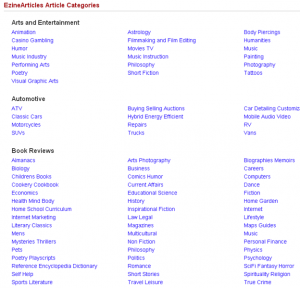Niche Selection
How to Choose and Research A Make Money Niche
Today’s Sponsor: Kim Witherspoon
Resources Mentioned: Word Tracker, Ezinearticles, Google
Last time you started learning about the different ways you can research a market to see if it’s profitable.
Let’s pick up where we left off…
b) Search Google
This is easy – enter your broad keywords into Google (such as “Mountain Bikes or bodybuilding” ) and see what comes up. You’re looking for two things:
- The organic results. These are the regular search engine results. Pay attention to the top sites (those on the first page).
What are these sites selling? If many of the top sites are directly selling products or services – or if they carry ads for products and services – that’s a good sign. And if they’re selling similar items, that’s a clue about which particular kinds of products are popular.
Secondly, look at the competition. Are there plenty of sites in the results? Again, that’s generally a good sign, because it shows some demand.
- The sponsored results. You also want to look at the paid ads that appear at the top, bottom and along the sides of the results. If there are only a couple ads, be worried. But if all the ad slots are taken, that’s good – because marketers don’t spend money advertising if there are no willing buyers.
c) Do a Keyword Search
Next, check out a keyword tool like WordTracker.com, Google Keyword Planner or your favorite tool. Enter your broad keywords. Do you see a lot of results? Do you see evidence that people are looking to buy?
Example: You might see searches for product names (e.g., [product name] review).
If you discover a lot of searches and you also notice that some of them are from buyers, that’s a good sign.
Example: A search like “buy [product name]” is a clear indication that the searcher is a real prospect.
d) Check Offline Publications
Now look at offline publications related to your market. For starters, are there magazines devoted just to your market?
Example: If you’re interested in dog training, then you’d quickly notice several dog-related magazines.
That alone is a good sign. But you also want to browse through these magazines and see what type of paid advertising appears in the publication. This will give you a clue about what’s hot in that market right now.
e) Keep an Eye Out for Other Paid Advertising
Listen to the radio and watch TV. Are there any channels or stations related to your market? If not, can you find any specific TV programs related to your market?
And if you watch the commercials, you’ll see plenty of paid advertisements for paid products. Both the show and the commercials indicate there is a demand for products in the market.
f) Look for Offline Marketplaces
Finally, you can look to offline marketplaces to see if there is a demand. You can look for retail shops or entire sections in big stores devoted to your market.
You should also look for offline events, like trade shows, conferences, and workshops in your market.
Final Stage Of Niche Research
The last part of research is getting an understanding of what types of products and affiliate programs exist for the niche. This will allow you to identify what type of products are in the niche and what is profitable.
Look at competitor products, generate your own product ideas, look for voids in the market, and even look at affiliate marketplaces and affiliate programs to get an idea.
When you look at affiliate marketplaces you are just trying to get an idea of what kind of products are available for the niche. This doesn’t mean that you have to monetize with affiliate products. Do this step to get an idea of what is already out there and to get potential product ideas.
Check out affiliate networks such as Amazon's Affiliate Program, Clickbank, Commission Junction, Alibaba, JVZOO, Ebay, Warrior Forum and many more.
Another great way to find affiliate programs for your niche is Googling your main keywords along with the words “affiliate program.”
If you niche was Day Trading you would Google:
Day Trading Affiliate Program.
It's as easy as that.
Next, let's head over to Ezinearticles to get some ideas. Go to the Ezinearticles sitemap. It breaks things down by category and subcategory. From there you can pick a sub-category and drill down to articles. This site is loaded with potential ideas for you to look at.
Bonus tip: There is a very cool website buzzsumo.com that lets you search for top content and influencers based on keywords that you type in. They have an algorithm that ranks the content and influencers based on social shares, page rank, page authority, and more.
This is a great place to look for competitors and influencers in your niche. It can also be a great place to get ideas for content, products, partnerships, guest blogging spots, finding writers and more.
Choose A Niche For Your Blog
Once you do all the research described in this lesson and the last, it will quickly become clear which of your potential markets have the most profit potential. Also, don’t forget to consider your interests. It is really hard to write about a topic you are not interested in so this is key.
If you have a couple that seem to be equal, then just choose the market you think you’d enjoy the most.
Today’s task: Complete the research as described above.
Now that you have done all the research it is time to choose your niche. Consider all the things you reviewed today and make your decision.
Tomorrow you’ll start learning how to set up your blog!
How To Tell If A Niche Is Profitable – Quick and Easy
Quote of the Day: “Be independent of the good opinion of other people.” - Abraham Maslow
Samuel Zemurray was called
Early on, he spotted a MASSIVE
And by making one “tiny shift”
He turned himself into one of
WORLD...
...All of the “big boy” banana sellers were throwing away the ripe speckled bananas. “Hmm…interesting!” He thought…
He had spotted his profit
He turned bad bananas
Keep reading to find out how you can spot your profit opportunity.
The One Reason People Fail Online – Niche Selection
Quote of the Day: "If you always do what you always done, you always get what you always got". - Beulah Underwood
She's the Author of "A Paycheck Away From Poverty": A Guide To Independent Financial Security. She was my mentor and the first person I heard used this quote.
Many people attribute this quote to Anthony Robbins and before him Albert Einstein, Henry Ford, and even Mark Twain. Regardless of the origin, what matters is the point it makes.
Day 2 - Niche Selection
The number one reason I see people fail online is NOT the technology, it's not the lack of motivation, it's that they pick the wrong niche.
Goal: Narrow down a small list of potential niches to enter
Resources: Google Keyword Planner, Forum directories, Article Directories, Niche Forums, Facebook Groups, Google Drive
Today is the day you take the first step towards creating a successful blog. The main goal for today is choosing your niche. There are two primary methods of thought for choosing a niche for your blog.
- Choose a niche for profitability
- Choose a niche that you have an interest in
Ask around about how to find a niche, and some people will tell you to follow your passions. Others will tell you to follow the money.
Here’s an idea: Start with your passions… but then find out if they’re profitable. That way you’re sure to make money, yet you’re also working in a niche which interests you.
Don't make this rookie mistake:
Many beginning bloggers and affiliate marketers make the mistake of choosing a product or two and then building a blog around that product. Then they have to figure out to whom they should sell the product.
Problem is, there may not be a demand for the product. Or there may not be an easily reachable niche market. Or perhaps it’s a “one hit wonder,” where you can get people to purchase this one product – but you can’t figure out what else to sell to them.
So here’s what you do instead: Find a hungry market first. And once you’ve determined that a market exists – and these folks are already buying products and services – then you can figure out what to sell them. (Usually, this means you sell them what they’re already buying).
Read on…
How to come up with niche ideas:
- Brainstorming your interests
- Listing what you are good at
- Browse forum directories
- Browse article directories
- Browse Niche Forums / Facebook Groups
- Use a keyword planner to expand on your list of ideas
So, the first step is to uncover a niche. Let’s start by brainstorming. Answer the following questions. Don’t limit yourself to just one answer per question. Indeed, you should list as many answers as possible for each question.
Brainstorming a Niche
- What are your favorite topics of conversation?
- What was your favorite topic in school?
- What job do you work now?
- What job do you wish you had?
- What kinds of sites do you visit regularly and/or have bookmarked on your computer?
- What kinds of TV shows/channels do you like to watch?
- What types of magazines do you subscribe to?
- What are your hobbies?
- What do you spend your expendable income on?
- If you had $1000 to spend right now to spend on yourself, just for fun – what would you do with it?
- What are your favorite books?
- If you could take three college courses, what would they be?
- What topics do you know a lot about?
- What topics do your friends ask you about?
- What type of events do you like to attend?
- List your other interests:
I use Google Drive, I can write my tips and collect my research notes, it's already built into Gmail for you. They have the equivalent of Word Editor on there. I post everything up there in the cloud.
Step 1: Log in to Gmail. If you don’t have a Google account you can always signup for a free one.
Step 2: Copy and Paste the above niche questionnaire into Google Docs. You will be able to access and use it anytime you want.
Today’s task: Complete the above questionnaire. Once you’re done with it, you should have several possible niches that interest you and that you know a lot about.


Recent Comments